|
Related FAQs: Xeniids, Pulsing Corals,
Xeniid FAQs 2,
Xeniid FAQs 3,
Xeniid FAQs 4,
Xeniid ID,
Xeniid Behavior,
Xeniid Selection,
Xeniid Compatibility,
Xeniid Systems,
Xeniid Systems 2,
Xeniid Feeding,
Xeniid Disease,
Xeniid Health 2,
Xeniid Health 3,
Xeniid Reproduction, Soft Coral
Propagation, Soft Coral
Health,
Related Articles:
Soft Corals, Order
Alcyonacea,
/The Best Livestock For Your Reef Aquarium:
The Pulsing Soft Corals, Family
Xeniidae, Part 3
To: Part 1,
Part 2,
|
|
Genus Xenia Lamarck 1816: Small cylindrical colonies (up to 4
cm in all dimensions typically), dome shaped. Sometimes branched, with
polyps only at apical stems. One-shape polyps with varying capacity to
retract, 1-6 pinnules on both sides (number of rows, pinnules
species-specific). Some pulsate, some don't. Forty plus
species, scattered over the Indo-Pacific. Fed on by similar appearing
Nudibranchs of the genus Phyllodesmium.
| Xenia cf. actuosa Verseveldt &
Tursch 1979. Large colonies, tentacles tubular shaped, white with
brown pinnules. A rapidly pulsing species. Western Pacific; New
Guinea, Philippines. N. Sulawesi pix. |
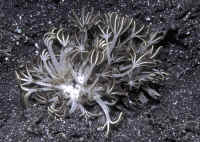 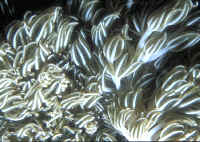
|
| Xenia cf. elongata, Red
Sea. |
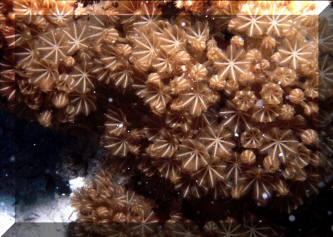
|
| Xenia umbellata Lamarck 1816, Bouquet
Encrusting Coral. Indo-Pacific; including the Red Sea. To about
five inches in overall dimension. Tissues contain zooxanthellae. On
import, do look for parasitic Nudibranchs and copepods
(Paradoridicola glabripes). This colony off of Queensland,
Australia. |
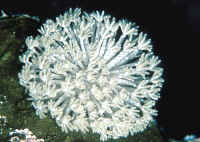 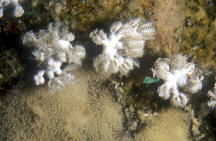
|
Bigger PIX:
The images in this table are linked
to large (desktop size) copies. Click on "framed" images
to go to the larger size. |
|
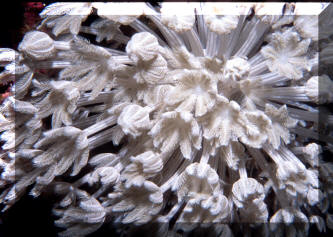
|
| Xenia sp. Branches support capitulums that
bear polyps at end. Stalks smooth, white, polyps mottled, brown.
Indo-West Pacific; Red Sea, East Africa to Australia, S. Japan,
Polynesia. N. Sulawesi pic. |
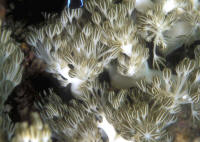
|
Bigger PIX:
The images in this table are linked to large (desktop size) copies.
Click on "framed" images to go to the larger size. |
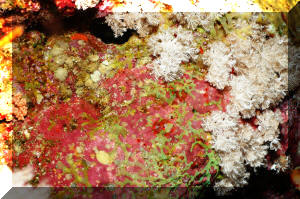
%20MD.JPG)
%20MD.JPG)
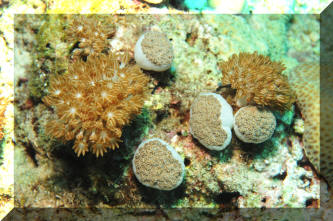 |
About Pulsing Coral Abundance: They can take over your
tanks...
| In places, the Pulsing Corals will dominate a given
environmental niche. Here three species, including the blue
Efflatournaria crowd a tridacnid clam off of Queensland,
Australia. |
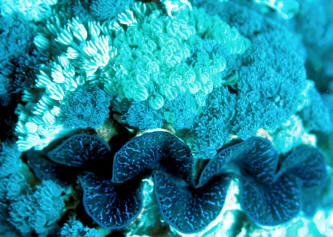
|
To: Part 1,
Part 2,
|
|

